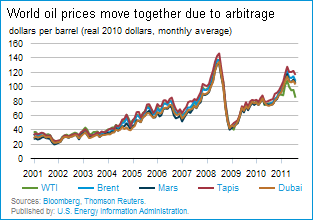 Energy pricing and market data. The US Energy Information Administration, the statistical agency for the U.S. Department of Energy, has created an online pricing data and market information system online here.
Energy pricing and market data. The US Energy Information Administration, the statistical agency for the U.S. Department of Energy, has created an online pricing data and market information system online here.
The EIA collects information, analyzes prices, and disseminates energy information to trading markets, policy makers, and the public. The access to, and cost of, energy is of obvious importance to modern society. The EIA is important because it is a primary source of energy information and, by law, its data, analyses, and forecasts are independent of approval by any other officer or employee of the United States government.
 The following is a list of the best books on the basic concepts and fundamental issues of energy, energy production, and the systems society uses to power itself.
The following is a list of the best books on the basic concepts and fundamental issues of energy, energy production, and the systems society uses to power itself.
Energy Transitions: History, Requirements, Prospects by Vaclav Smil. Smil is a prolific and phenomenal writer. He is on the faculty of Environment at the University of Manitoba in Winnipeg, Canada. His interdisciplinary research covers a broad area of energy, environmental, food, population, economic, historical and public policy studies. Smil is also the author of one of the foundation textbooks in the field:Energy at the Crossroads: Global Perspectives and Uncertainties. For beginners, or co-workers and staff who need to get up to speed on these issues quickly, Smil compiled a series of his essays in Energies: An Illustrated Guide to the Biosphere and Civilization.
A remarkably clear and cogent overview of energy issues and the economics of energy and power production is ENERGY: The Master Resource by Robert Bradley and Richard Fulmer. The book is set up as a textbook, but is written more engagingly and has excellent infographics. The sources cited alone are worth the cost of the book. Bradley and Fulmer (who also blog at MasterResource.org) systematically cover the systems of energy production and distribution, but go beyond describing the technology and explore the economics of each component part, including many different alternatives.
For an aggressive alternative view of ‘green’ energy solutions there’s Robert Bryce’s Power Hungry: The Myths of “Green” Energy and the Real Fuels of the Future. While you may argue with his tone and occasional outspoken comments, his basic argument centers on four imperatives for any energy system redesign “power density, energy density, cost and scale.” These key considerations come up again and again in the literature from either side of the green energy issue.

You must log in to post a comment.